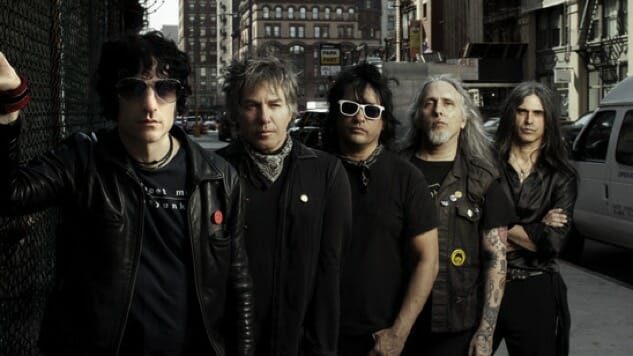D Generation: Reason to Believe in Tomorrow
Photo by Justin Borucki
When rock ’n’ roll lifers and truest of true believers Jesse Malin and Danny Sage talk about their hometown of New York City, the past and the present are never far apart.
One recent July evening, when the pair met at Niagara on Avenue A to discuss Nothing Is Anywhere, the fantastic new album by their reactivated glam-punk band D Generation, tales of yesterday and today rubbed up against each other like the kids in the giant photo hanging on the back wall. The black-and-white shot was taken circa 1982 at a hardcore show held in the very same room, back when the place was called A7. Malin himself is in the picture, standing next to a teenage Adam Yauch, later known to millions as MCA from The Beastie Boys.
Inspired by the groups they saw at clubs like A7, Malin and Sage started playing music together in the early ‘80s and formed D Generation in their 20s at the turn of the next decade. Although the Ramones were on their last legs and drab and dreary grunge was gaining strength, the trashy, punky, makeup-smeared quintet made a pretty decent noise. With Malin on vocals and Sage on lead guitar, D Gen toured with the likes of Green Day and KISS and released three killer LPs before calling it quits in 1999—right before The Strokes and Interpol hit, and New York City rock ’n’ roll became a thing again.
“A lot of those bands broke the New York curse,” says Malin, 48, who turns up for the interview in a snug, stylish, totally stage-ready black vest and matching button-up, even though he’s just come from rehearsal in some basement a few blocks over. “When we went out in the ‘90s, it was still at a time people weren’t just into everything. We’d get on stage, and it’d be like a war with the audience sometimes.”
“What does New York represent? All of this left-leaning stuff,” says Sage, 51, who also goes through life dressed like a Bob Gruen photoshoot could break out at any moment. “I think of it as really good. But you’d go play Peoria, and people weren’t into New York. They all want to live here now because of Sarah Jessica Parker.”
And with that Sex and the City reference, we’re back into the present, more or less. (Girls comes up later in the conversation.) In these streaming, smartphone-powered days, Malin says, people don’t swing dog chains at bands they don’t like. In fact, nowadays, everyone likes everything—and worse yet, they don’t even know why. Even in New York City, there’s a troubling lack of character and passion. That’s part of what D Gen—which also includes Howie Pyro on bass, Richard Bacchus on guitar, and Michael Wildwood on drums—sings about on Nothing Is Anywhere.
“The record is about now,” says Malin, a Queens native who’s spent his post-D Gen years cultivating a solo rock-troubadour persona pitched somewhere between Paul Westerberg and Bruce Springsteen. “It’s dealing with things we’re confronted with in 2016. There’s a lot of disgust, but there’s also the story of where we came from. The history of the band is a subplot to us singing about all this stuff in the world now.”
-

-

-

-

-

-

-

-

-

-

-

-

-

-

-

-

-

-

-

-

-

-

-

-

-

-

-

-

-

-

-

-

-

-

-

-

-

-

-

-








































